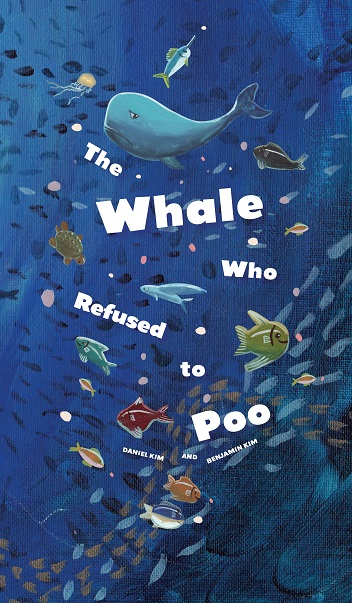We also wanted to address the issue of illegal whaling, which can have devastating effects.
Daniel Kim – 3 July 2023
The Back Flap
Baby Whale feels shy about pooping in the ocean. Surrounded by other fish and plankton, he never learned why he had to poop in front of everyone. He journeys to the bottom of the ocean for some privacy and meets a scholarly octopus who explains to him how important it is to poop; that it helps share important nutrients to the fish and plankton around him. With this new knowledge, Baby Whale is ready to go back to the surface and poop again.
With deeper themes and lessons of the interconnection between all creatures featuring beautifully drawn images, The Whale Who Refused to Poo is the perfect book to help children understand the importance of protecting animals in their ecosystem and teaching them that some things are necessary for survival.
About the book
What is the book about?
The Whale Who Refused to Poo is a story about an orphaned whale who discovers its role as a vital source of nutrition for smaller creatures in the ocean by learning the importance of defecating after feeling embarrassed.
When did you start writing the book?
I began writing about the book when I was nine years old, along with my brother Benjamin.
How long did it take you to write it?
It took us around a month to craft the overarching narrative, conduct research on scientific facts, and curate a collection of reference images.
Where did you get the idea from?
We were both fascinated by the concept of the Whale Pump after reading about it. Typically, whales defecate in the upper part of the water column, where they breathe. This creates a phenomenon known as the “whale pump,” which reverses the usual flow of nutrients in the ocean’s biological pump. Normally, marine snow and detritus flow downwards from the surface to the bottom. However, with whales defecating in the upper part of the water column, nutrients are brought back up to the surface.
We also wanted to address the issue of illegal whaling, which can have devastating effects. To illustrate this issue, we present the story of an orphaned baby whale who must learn about the importance of the whale pump on his own, without the usual guidance of his parents.
Were there any parts of the book where you struggled?
The most challenging part of the project was when the baby whale met a wise octopus. Setting up the encounter was already difficult, but condensing the necessary information into a single-page illustration was an even greater challenge.
What came easily?
Nothing came easily. We rewrote the story so many times that we lost count. Drawing was a task that required high concentration. But the thought of sharing knowledge and awareness with many children when they read this book brought us joy.
Are your characters entirely fictitious or have you borrowed from real world people you know?
The characters in the story are entirely fictitious.
We all know how important it is for writers to read. Are there any particular authors that have influenced how you write and, if so, how have they influenced you?
When I was younger, I loved Ronald Dahl’s books. Nowadays, my favorite author is Rick Riordan. I appreciate their imagination and creativity, as it helps me expand my thinking horizons. Their writing encourages me to write more engaging stories, and reinforces the importance of writing to me.
Do you have a target reader?
For this particular book, I hope that its target audience of kindergartners and elementary students will not only enjoy reading it, but also learn about the concept of whale pumps and the crucial importance of banning illegal whaling. It is crucial that we educate the next generation about these issues, as they will be the ones to make the necessary changes to protect our planet’s wildlife.
About Writing
Do you have a writing process? If so can you please describe it?
Once I find a subject I would like to write about, I do research about the subject and think about a story and characters that can encapsulate those facts to be delivered most effectively.
Do you outline? If so, do you do so extensively or just chapter headings and a couple of sentences?
When writing picture books, I create an outline and, most importantly, storyboards. I aim to fit the entire story within a set number of pages and assign a specific number of boards for each part of the story arc.
Do you edit as you go or wait until you’ve finished?
I do both. I edit as I go and also review the entire creation and go through to edit. Editing is a critical process in writing.
Do you listen to music while you write? If yes, what gets the fingers tapping?
I love ABBA. I know it’s an old band for me to be a fan of, but I went to their concert in London, which was recreated through completely digitized 3D avatars, and I fell in love with their songs.
I tap my fingers when I’m thinking and trying to come up with new ideas to fill in the blanks.
End of Interview:
Get your copy of The Whale Who Refused to Poo from Amazon US or Amazon UK.

